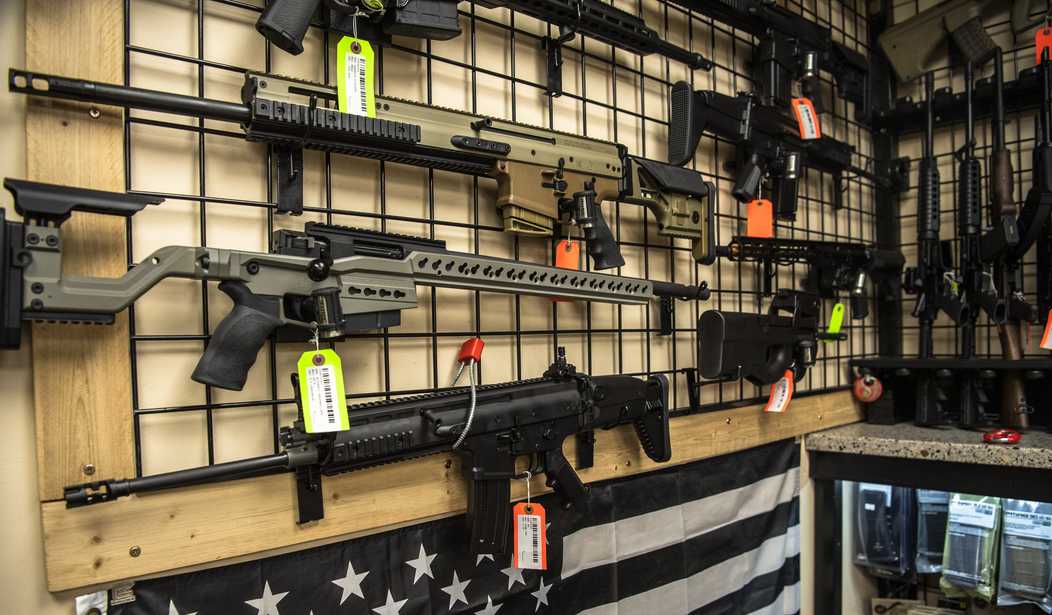Just days after the Supreme Court turned away a challenge to a ban on so-called assault weapons, the Rhode Island legislature is preparing to vote on its own gun ban, one even more sweeping than the Maryland prohibition that SCOTUS left in place.
Maryland's law defines an "assault weapon" as a centerfire rifle that can accept a detachable magazine or has a fixed magazine with more than ten rounds and at least two features like a folding stock; a grenade launcher or flare launcher; or a flash suppressor. The bill under consideration in Rhode Island, meanwhile, prohibits all gas-operated semi-automatic long guns that can accept a detachable magazine or has a fixed magazine with a capacity of more than ten rounds, regardless of what other cosmetic features can be found on the firearm.
The House Judiciary Committee is voting on the gun ban bill this afternoon, and it's almost certain to be sent to the House floor for a vote later this week, though there's the possibility of some modest changes to the legislation.
In Rhode Island, the House Judiciary Committee is expected to consider an amendment to Knight’s bill that would replace a requirement that grandfathered assault weapons be registered with police. Opponents had called the requirement clearly unconstitutional.
The amendment would create a voluntary program through which those who already own assault weapons could get a certificate of possession from their local police department that would serve as legally admissible proof that their weapon is grandfathered, the House said in a statement.
To address concerns that such certificates would serve as a de facto registry, the amendment’s language prohibits police from keeping any record of the application or granting of such certificates. Since the certificate program would be voluntary, grandfathered owners could legally opt to do nothing when the bill takes effect, the House said.
The amendment also would include “more precise definitions” of the weapons that would be prohibited, the House said.
Removing the registration requirement addresses one concern from opponents of the bill, but there's no fixing legislation that criminalizes the sale and future possession of the most common and popular rifles in the country.
A majority of House members have already signed on as co-sponsors, and H5436 could win approval in the lower chamber as early as Thursday of this week. A majority of state Senators has also backed the Senate version of the gun ban bill, so the only realistic chance of defeating it will come when the Senate Judiciary Committee votes on the measure.
That committee is believed to be evenly split on the legislation, but thanks to a quirk in Rhode Island parliamentary procedures members of Senate leadership can sit in and cast votes on any committee they want. To make things even more interesting, Democratic Senate leaders are also divided on the gun ban bill. Senate President Val Lawson, who's also the head of the state's largest teacher's union, is a firm supporter of the bill, while Senate Majority Leader Frank Ciccone has come out in opposition to the legislation, at least in its current form. Senate Majority Whip David Tikoian hasn't made his stance known, but he's objected to other gun control bills in the past.
If Lawson allows Senate leadership to vote on the bill in committee, it will likely fail to reach the Senate floor. But Lawson could play games with the bill by referring it to another, friendlier committee or using parliamentary sleight of hand to send the House bill directly to the full Senate for consideration.
The House noted the ban on assault-style weapons is the only major unaddressed recommendation made by a gun-safety working group established by former governor Gina M. Raimondo after the 2018 mass shooting at Marjory Stoneman Douglas High School in Parkland, Fla.
The General Assembly has passed legislation to ban large-capacity gun magazines, require the safe storage of firearms, raise the legal age to purchase firearms or ammunition to 21 from 18, and prohibit the open carry of any loaded rifle or shotgun in public.
And what has happened to the state's homicide rate as all those gun control measures were put in place? There were 25 murders in 2019, compared to 28 homicides in 2023. The state had a relatively small number of murders before the onslaught of gun control measures that have been put in place over the past six years, and those numbers have basically been unchanged even with the magazine ban, gun storage mandate, and raising the age to purchase a firearm or ammunition.
Given the small number of crimes committed with rifles of any kind, the gun ban isn't likely to have an impact on public safety if it's enacted into law. It will be the rights of Rhode Island residents that will be diminished, not the number of people murdered in the state.
I doubt that the Democrat-majority legislature would have hit the pause button on the bill even if the Supreme Court had accepted the Snope case this week, but anti-gun advocates are pointing to the Court's decision not to grant cert as a green light for their gun ban plans.
Three conservative justices dissented, showing that the high court is still divided on how to handle Second Amendment cases after it expanded gun rights in a 2022 landmark decision. Another conservative justice said the Supreme Court should address the validity of bans on assault-style rifles like the AR-15 in the next term or two.
[Rep. Jason] Knight said none of that should prevent Rhode Island from passing a ban on assault-style weapons.
“States should generally go ahead with their legislation unless it’s clearly against the law because that is how federalism works,” he said. “On this issue in particular, I think the Supreme Court has spoken without speaking. They have had opportunity to take up assault weapons bans and haven’t done it.”
Kavanaugh specifically said that the decision not to grant cert was not an endorsement of the Fourth Circuit's ruling upholding Maryland's prohibition on "assault weapons", but as Second Amendment advocates predicted, the anti-gunners are still going to spin the Court's inaction as tacit approval of semi-auto bans. Rhode Island's anti-gun politicians are feeling particularly emboldened, since SCOTUS also rejected a challenge to the state's ban on "large capacity" magazines that requires current owners to destroy those items, turn them over to police, or transfer them out of state in order to avoid criminal charges.
Rhode Island gun owners have been absolutely fantastic at turning up at the statehouse to express their opposition, and they far outnumbered supporters of the gun ban bill during a Senate hearing back in March. I can't say enough about their efforts to stand up for their Second Amendment rights, and if they keep up the pressure they may very well eke out a huge victory in the waning days of this year's session.









